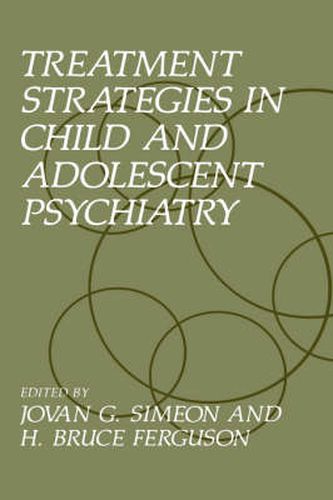Readings Newsletter
Become a Readings Member to make your shopping experience even easier.
Sign in or sign up for free!
You’re not far away from qualifying for FREE standard shipping within Australia
You’ve qualified for FREE standard shipping within Australia
The cart is loading…






This title is printed to order. This book may have been self-published. If so, we cannot guarantee the quality of the content. In the main most books will have gone through the editing process however some may not. We therefore suggest that you be aware of this before ordering this book. If in doubt check either the author or publisher’s details as we are unable to accept any returns unless they are faulty. Please contact us if you have any questions.
It is clear that child and adolescent psychiatric disorders impose a heavy burden of suffering. Recent large-scale community epidemiological studies suggest that as many as 20% of children and adolescents in the general population may have clinically important mental disorders. These disorders are accompanied by associated impairments in various domains of the child’s life, resulting in lowered life quality for the child and his or her family. In addition, for some conditions, the onset of the disorder in childhood heralds a lifetime of serious psychosocial disturbance for a significant subgroup of affected children. For instance, about 40% of children seen in clinic settings with conduct disorder in late childhood and early adolescence will have serious psychiatric disorders in adult life. Finally, the heavy burden of suffering of these conditions is indicated by the large amounts of both human and financial resources devoted to their assessment and treatment. There is a pressing need in the field for effective treatments (that is, those that have been shown to do more good than harm) that will result in a significant reduction in the burden of suffering resulting from these disorders. Further, these effective interventions must be readily available and acceptable to clini cians in the settings in which children with mental disorders (and their families) seek care. This book addresses an important need in the treatment field.
$9.00 standard shipping within Australia
FREE standard shipping within Australia for orders over $100.00
Express & International shipping calculated at checkout
Stock availability can be subject to change without notice. We recommend calling the shop or contacting our online team to check availability of low stock items. Please see our Shopping Online page for more details.
This title is printed to order. This book may have been self-published. If so, we cannot guarantee the quality of the content. In the main most books will have gone through the editing process however some may not. We therefore suggest that you be aware of this before ordering this book. If in doubt check either the author or publisher’s details as we are unable to accept any returns unless they are faulty. Please contact us if you have any questions.
It is clear that child and adolescent psychiatric disorders impose a heavy burden of suffering. Recent large-scale community epidemiological studies suggest that as many as 20% of children and adolescents in the general population may have clinically important mental disorders. These disorders are accompanied by associated impairments in various domains of the child’s life, resulting in lowered life quality for the child and his or her family. In addition, for some conditions, the onset of the disorder in childhood heralds a lifetime of serious psychosocial disturbance for a significant subgroup of affected children. For instance, about 40% of children seen in clinic settings with conduct disorder in late childhood and early adolescence will have serious psychiatric disorders in adult life. Finally, the heavy burden of suffering of these conditions is indicated by the large amounts of both human and financial resources devoted to their assessment and treatment. There is a pressing need in the field for effective treatments (that is, those that have been shown to do more good than harm) that will result in a significant reduction in the burden of suffering resulting from these disorders. Further, these effective interventions must be readily available and acceptable to clini cians in the settings in which children with mental disorders (and their families) seek care. This book addresses an important need in the treatment field.